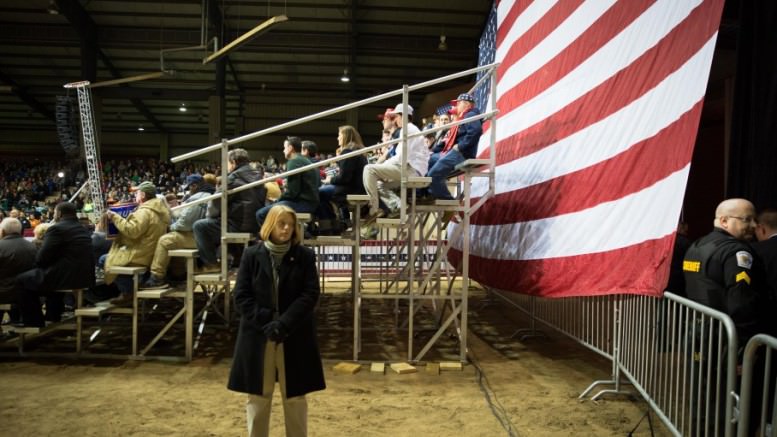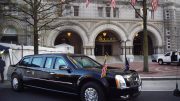
A Secret Service agent stands guard during a rally for Republican presidential candidate Donald Trump in South Carolina. (Kevin D. Liles for The Washington Post)
After 16 years watching less-experienced white agents zoom past him on the promotion ladder at the Secret Service, straight-laced Ray Moore grew so fed up in 2000 that he led a group of fellow black agents in filing a lawsuit that claimed a pattern of racial discrimination.
Sixteen years later, Moore, 57, is ready to retire — and has yet to have his day in court. This week, he is pleading with the federal judge overseeing the case to grant a hearing to more than 120 of his fellow black agents and force the service to revamp its promotion system.
“Dr. King would often say, ‘Justice Delayed is Justice Denied,’ and I fully understand his sentiment,” Moore said in a letter to U.S. District Chief Judge Richard Roberts. “On the occasion of my retirement, I ask that you please allow this case to move to trial, so that the Secret Service will be held accountable to the justice system, if not to me as an active Secret Service Agent.”
Moore, who was rated among the top 20 supervisory agents when he accused the service of institutional racism, told the judge he was repeatedly warned that the agency would simply try to “wait him out.”
From his home in Atlanta, Moore acknowledged that the agency has now succeeded in outlasting him, but argued that other black agents shouldn’t have to wait any longer.
“I want to see justice for the almost 120 class members who have been discriminated against by the Secret Service and the generations of other Agents who are now walking in our shoes,” Moore told The Washington Post in an email. “We filed this lawsuit 16 years ago to make the Agency live up to its ideals. That goal is not yet fulfilled. The Secret Service’s stall tactics and delays in our justice system have prevented the Secret Service from being held accountable. It is well past time that a jury hear our case.”
As part of the long-running class action case in the District’s federal court, Moore and other agents have testified about discrimination. Moore said he knows the service doesn’t want to hear its “dark secrets” shared in open court but predicted that any jury would demand agency reform after hearing his testimony about how the system unfairly denied better pay and plum assignments to deserving black agents.
“We will prevail,” he said. “Many of the dark secrets of the Secret Service will come out during trial, including e-mails with racist, offensive jokes being sent by Secret Service leaders, evidence of a noose being hung for black Agents to see, and story after story of agents who were denied promotions, despite impeccable qualifications to serve, because of their race.”
A Secret Service spokesman did not respond to requests for comment. The service has said that African Americans are promoted at a faster rate than their white counterparts. In 2008, Secret Service officials told ABC News that the aggrieved black agents were trying to embarrass the agency at a time when voters were in the process of electing the nation’s first black president.
The black agents’ stories all tread a similar track. New black agents who joined the service were hired at lower ranks and pay than white agents with comparable experience.
Black agents who tried to follow the agency’s golden path for promotion found mostly disappointment, losing promotions repeatedly to white agents who had not tackled the same assignments.
Often the most crushing blow, the black agents claim, was losing a promotion to junior white agents they had trained.
Moore, a compact, muscular man who is careful and deliberate in his speech and movements, is a case in point. He was ranked on his performance evaluation as the service’s highest-scoring black agent. But in 1999 and 2000, Moore said, he was passed over during dozens of promotion opportunities.
He decided to file a discrimination complaint and then was joined by a second agent. Not long after, 50 black agents showed up at his attorney’s office and revealed that they had had similar experiences.
Several agents involved in the lawsuit have died since the papers were filed. One was Phil Strother, the only black agent on the detail of President Lyndon B. Johnson (D). Strother described being called “Johnson’s n—–” whenever he traveled with the president.
Strother said agency racism was overt in the early part of his career starting in 1965, when a supervisor complained to him about having to go to a “n—– school” to recruit black agents. Later, Strother said, discrimination came in the form of the cold shoulder. While he received some of the agency’s highest performance ratings, he said his pay remained at the GS-14 grade for his final 12 years on the job.
“The ‘Secret Service family’ is a term I heard a lot, but it’s a term I have only heard come from white agents,” Strother told The Post in 2001. “I question whether the system ever intended for minorities to be part of this family they are always talking about.”
In the most recent pleadings in the case, in September 2015, the black agents’ attorneys at Relman, Dane & Colfax asked the judge for a status conference to discuss a possible date for trial. Justice Department lawyers representing the Secret Service opposed this request, arguing that discussing a trial date was “premature.”
Carol Leonnig covers federal agencies with a focus on government accountability.
Source: www.washingtonpost.com




